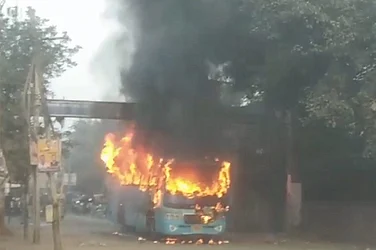Defence Minister Rajnath Singh on Thursday said India's borders are "fully secure" and asserted that surgical strikes conducted by India have broken the back of terrorists.
Addressing a conclave here, he also said that whether it was the "standoff with China or any ill intentions from Pakistan", Indian armed forces have been giving a "befitting reply". Singh further said that India has led the world on issues like terrorism and has been successful in garnering support to eliminate the menace.
"Our borders are fully secure. Whether it was the standoff with China or ill intentions from Pakistan, our armed forces have been giving a befitting reply, whenever required. "The surgical strikes against terrorism have broken the back of terrorists. A strong and clear message has gone to the world that India has the strength and it can strike (against terrorism) on its own soil, and if need be, on their (foreign) soil as well," he said.
This is the result of strong will of the government, the defence minister said. He emphasised that countries, which use terrorism as a tool, are well aware of the fact that India never harms anyone unnecessarily, nor does it spare anyone who tries to hurt its unity, integrity and sovereignty.
He was speaking at the 'India Rising Conclave' organised by a leading television media network. "This is a conclave on rising India. And, the idea of rising India has been described differently by different people. Some economists see it as a rising economy of India, while some sociologists describe it as betterment in social living. Some political scientists term the political stability in the country and strengthening of democratic values as rising India," Singh said.
However, some people speaking contrary to this too are also active, and for them, 'democracy seems to be on the wane in India', but such people are very few and far between, he said.
From secure borders and self-reliance to a strong economy and transformed global image, India is rising as one of the "strongest countries" under the leadership of Prime Minister Narendra Modi, the defence minister said.
He termed the abrogation of Article 370 in Jammu and Kashmir as another example of the strong will of the government, asserting that the Union territory has ushered in a new era of peace and progress due to the decision.
"One can assess this from the fact that Congress party while carrying out its 'Bharat Jodo Yatra' did not face any difficulty. The Yatra left Kashmir without any issue," he said.
Singh said that the government is carrying forward the vision of former prime minister Atal Bihari Vajpayee, under whose leadership nuclear test was conducted in Pokhran in 1998. "Today, we are producing big missiles, tanks, weapons and ammunition on our land. This is also a result of a strong political will," he said.
He also highlighted the government's resolve towards the development of the Northeast region, saying that it has been ensured that the region, full of beauty and natural resources, is well connected with the heart of the country.
The Northeast has come closer to Delhi and 'dil' (heart) of people due to the Centre's efforts, Singh said. There is "unprecedented peace" in the Northeast, which has resulted in the withdrawal of Armed Forces (Special Powers) Act or AFSPA, from most areas, he added.
He also outlined some of the achievements of the government in the last several years, and India's vision for the future ahead. When 5G rollout in telecom is happening, "our PM has started working on 6G", he said. "The cheapest mobile data service in India. The reach of broadband connectivity from 20 per cent in 2014 has grown to 80 per cent now," Singh said.
India's export has grown tremendously and even the record foreign direct investment is a "positive signal", the minister said. "India's time has come. This is rising India," he said, adding today, there is a vibrant digital economy.
He credited bold approach and unwavering resolve of the government, which has ensured secured borders and battle-ready armed forces backed by a self-reliant defence industry. Terming national security as government's top priority and self-reliance as the only medium to achieve it, he asserted that relentless efforts are being made to attain 'Aatmanirbharta' in defence.
He listed out some of the steps taken by the Ministry of Defence, including notification of positive indigenisation lists; earmarking of record 75 per cent of defence capital procurement budget for domestic industry in financial year 2023-24 and efforts to provide local companies access to international market.
Singh said the domestic defence production has witnessed a significant increase in the last few years. "We are not only catering to our own needs, but are also exporting weapons and equipment to other countries. From Rs 900 crore, about seven-eight years ago, defence exports have skyrocketed and are nearing Rs 14,000 crore in the current financial year. Our target is by 2026, it should be worth Rs 40,000 crore," he said.
In the last few years, the social changes achieved has been "remarkable", the minister said. "Caste-based vote bank politics and religious appeasement were being carried out. Triple talaq issue was one, it was being used to do politics, and women were also being cheated in the name of religion," Singh said.
"We worked to give them dignity, equality, and freedom," he said. In his address, he also said that the current cabinet is by far the "most socially diverse cabinet" and even media has reported on this earlier. Despite this, there are many people in the country, who have made 'virodh' (opposition), as an 'occupation' to "tarnish the image of the country, and the image of Prime Minister Narendra Modi", the minister said.
Citing a report by Morgan Stanley, Singh emphasised the growth of the Indian economy. "In 2013, investment firm Morgan Stanley had coined a phrase 'fragile five' economies, and named India among them. We have successfully dealt with the problems such as the possibility of recession and COVID-19 pandemic, and today we are an inspiration to other countries. The highest ever FDI inflow of USD 83.57 billion last year is a positive sign for the economy and a proof that the world has faith in the possibilities and opportunities available in India. From 'fragile five', we are now among 'fabulous five'," the minister said.
According to a report by Morgan Stanley, this possibility cannot be ruled out that India will be one of the top three economies of the world by 2027, Singh said. "When we celebrate the 100th anniversary of our independence in 2047, I am hopeful that we will be the world’s top economy," he said. He described India's diplomacy as another facet of rising India and said the presidency of G-20 and Shanghai Cooperation Organisation (SCO) this year is proof that India’s stature is continuously growing on the world stage.


























